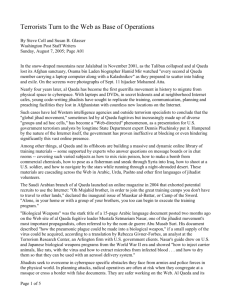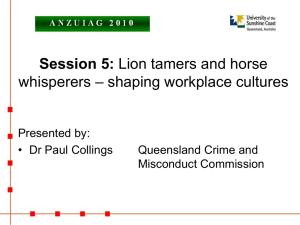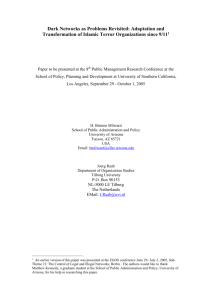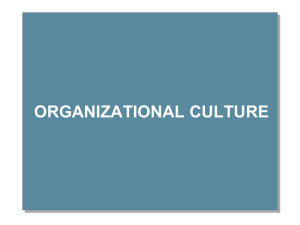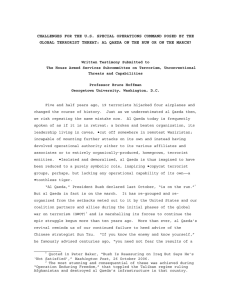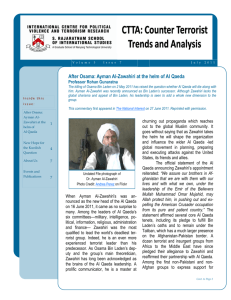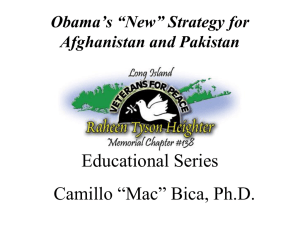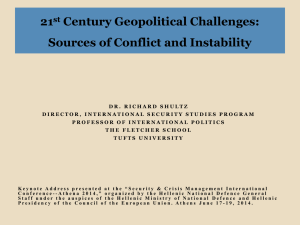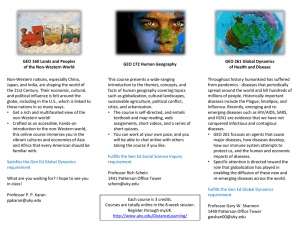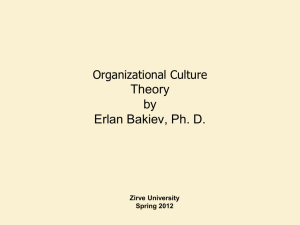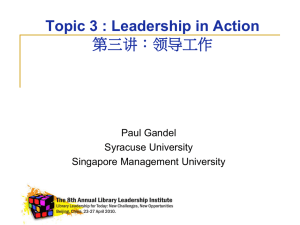Organizational Culture of al Qaeda
advertisement
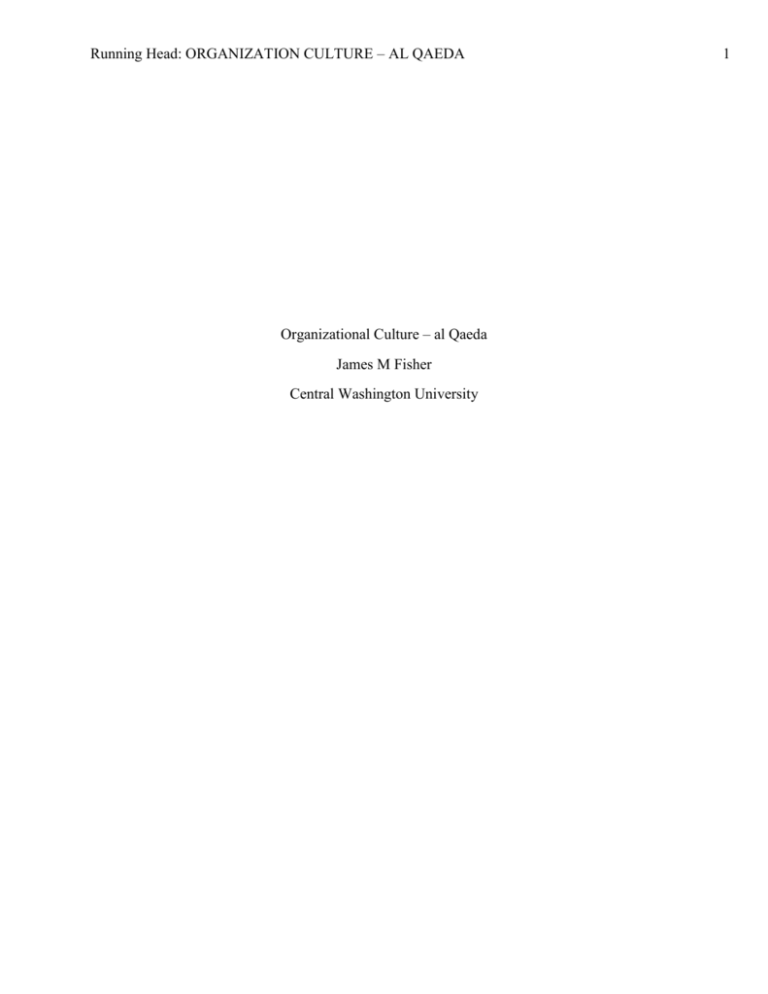
Running Head: ORGANIZATION CULTURE – AL QAEDA Organizational Culture – al Qaeda James M Fisher Central Washington University 1 2 SCHEIN’S MODEL – AL QAEDA Abstract Within this paper I will provide a brief overview of Edgar Schein’s model of organizational culture and discuss how it can be related to the terrorist group called al Qaeda located predominantly in Afghanistan. Through each level of the model I will provide examples and details of how it pertains directly to the terrorist group. Keywords: Afghanistan, al Qaeda, level, terrorist, culture 3 SCHEIN’S MODEL – AL QAEDA Organizational Culture – al Qaeda Edgar Schein is a management scholar and consultant interested in the role of leaders in the development and maintenance of organizational culture, it is within his book Organizational Culture and Leadership that he describes his model (Miller, 2012). Schein’s model consists of three levels: 1) artifacts, 2) espoused values, and 3) basic assumptions. In order to fully explain what his model is and what it stands for you must first have a good understanding of Schein’s definition of culture itself. According to the textbook, he describes culture as “a pattern of shared basic assumptions that the group learned as it solved its problems of external adaption and internal integration, that has worked well enough to be considered valid, and, therefore, to be taught to new members as the correct way to perceive, think and feel in relation to those problems” (Miller, 2012). Without going any further it is quite easy to see how the culture of those within terrorists group is displayed. They solve problems by exterminating the conflicting opinion. Organizations like al Qaeda are able to spread their culture through the communication of their beliefs, ideas, and actions. Al Qaeda is a global militant Islamist organization founded by Osama Bin Laden back in the late 1980s. Schein’s model has three levels that all stem from one another, it starts with basic assumptions, and like layers of an onion it will stem from that to espoused values and artifacts on the outer layer. Such as business organizations, they may have the basic assumption that change is bad therefore they will value steadiness and sustainability, which could lead to the strict following of rules and not venturing to new ideas. This behavior will be the result of the core assumption that change is bad. 4 SCHEIN’S MODEL – AL QAEDA The most visible layer of culture in Schein’s model consists of the physical and social environment that the organizational members create, like Schein states, it is difficult to decipher, especially with a hidden terrorist group such as al Qaeda (Miller, 2012). What we do know about them is that they dress like any ordinary middle eastern/Muslim person. Women have their heads covered, same skin tone and hair color, and dress similarly. Al Qaeda carries out multiple attacks on foreign influences; by foreign I mean any non-Muslim country. These attacks include suicide bombings, simultaneous bombings and raids. Al Qaeda and other terrorist typically rely on guerrilla warfare, where they do not abide by rules of the Geneva Convention and rules of war. Guerrilla warfare is generally fought by poor countries with a lack of technological advancement and resources. Since we know that al Qaeda doesn’t value physical items or money, they only value actions and religion which leads us to Schein’s second model; espoused values. Knowing that al Qaeda does not value materialistic things allows us to realize their value for non materialistic things such as actions and religion. Their root reasoning for their extremist actions is due to their religious beliefs. They feel they need to cause these acts of terror in order to please Allah (God), what they are doing is good in their minds. When they do suicide bombings they consider it an honorable way to die. Al Qaeda thinks man-made laws shouldn’t exist; they feel so strongly against outer influences that they ignore the scripture that states murder as being a bad thing. To them, killing civilians is religiously sanctioned so long as their doing it with the mindset of removing foreign influence. Due to the attacks on all foreign influences it is safe to assume that they feel all other religions are a threat and should be relinquished. We can make this basic assumption because of their actions and values. Al Qaeda holds many assumptions, for example they think the Jewish 5 SCHEIN’S MODEL – AL QAEDA and Christian communities are conspiring against Islam, so with this conviction being bestowed upon all members of al Qaeda they all assume it is their purpose to destroy the Jewish and Christians. Their leader; Osama Bin Laden persuaded people of this extremist belief, without him this global militant Islamist organization may have never taken off, even when there were several people who shared similar beliefs as him. Like all organizations, it took one individual to start and inspire those to follow him. I personally hate what al Qaeda stands for and what they do; I disagree with everything they do and the reasoning behind it. I feel this way because my artifacts, values and assumptions that I have accumulated throughout my life. Just like al Qaeda, my behaviors of joining the military stem from my value of a freedom which consequently comes from my assumption that everyone deserves to live freely and pursue happiness. Al Qaeda uses the same thinking but rather than having the basic assumption of everyone deserving a chance to live freely and pursue happiness they have the assumption that everyone is out to get them and that in order to sustain their religion and way of life they must obliterate any and all foreign influence. Due to this conflicting way of thinking we clash, one of the two cultures either ours or theirs will never be satisfied while the other exists. Clearly, al Qaeda not only fits Schein’s definition of a culture but they can be related to each of the three levels of his model. With their underlying assumptions about the world being reflected in a set of values that in turn generates behaviors and artifacts. Even though they fail to reason with us, they continue to think we and other foreigners are the enemy. “Their basic assumptions reveal a coherent paradigm that guides their united culture” (Miller, 2012). For now we too must fight for what’s right and in time the righteous will come out on top. 6 SCHEIN’S MODEL – AL QAEDA References Miller, K. (2012). Organizational Communicational (Sixth ed.). (M. Eckman, Ed. Boston, MA, USA: Wadsworth Cengage Learning.
